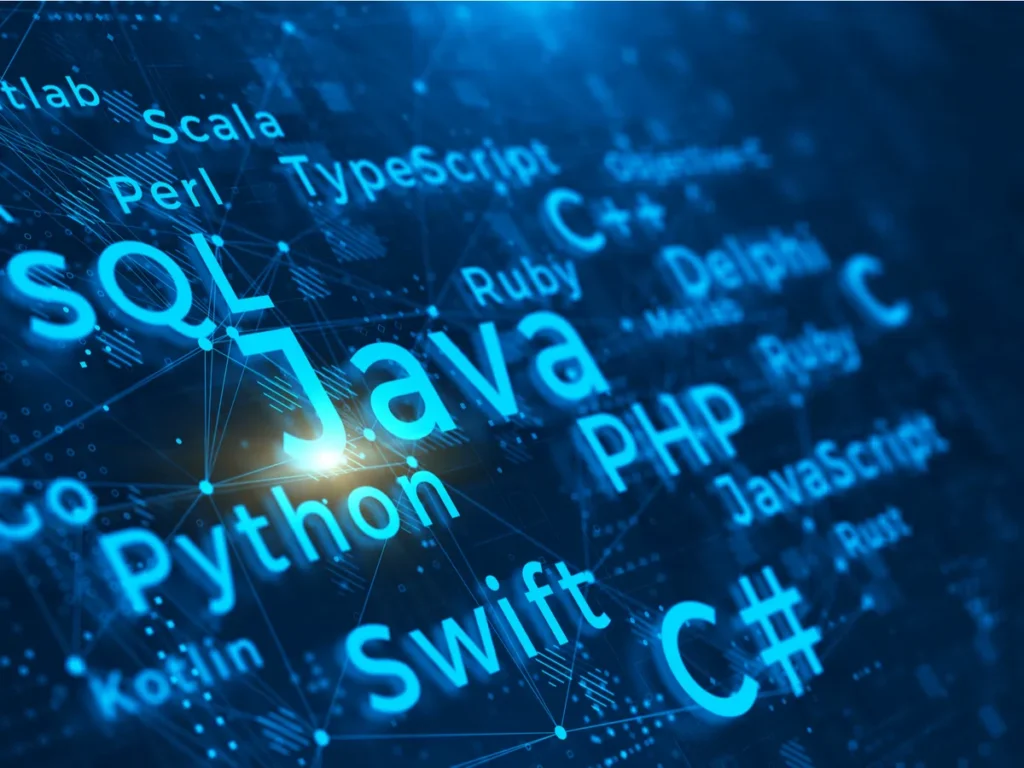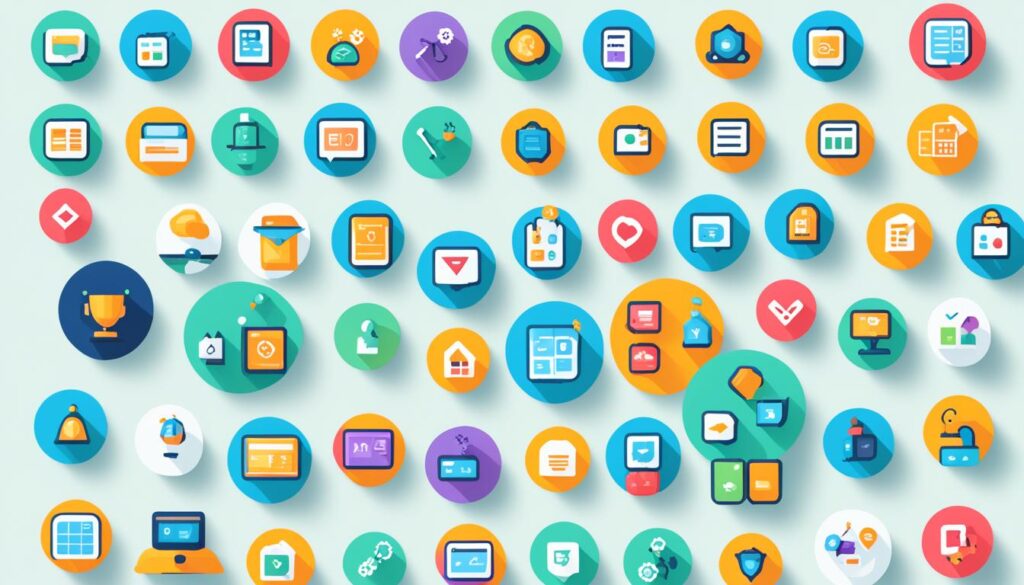Are you starting to code for fun, a new job, or to boost your skills? First, you need to pick a programming language to begin with. The right choice depends on your goals, what you like, and the projects you aim to work on. This guide will walk you through the best languages for beginners and help you make a smart choice.
Choosing a programming language can feel like a big task with so many options out there. You could go for Python, JavaScript, Java, or C++. The goal is to pick one that fits your dreams and how you like to learn. Knowing what each language is good for can help you decide where to start.

Key Takeaways
- There is no single “best” programming language to learn first, as the choice depends on your goals, interests, and the type of projects you want to work on.
- Python is often recommended for beginners due to its simplicity, readability, and versatility, making it a great starting point for those exploring programming.
- JavaScript is a popular choice for building websites and web applications, and its widespread use makes it a valuable skill to have.
- C/C++ are essential for working with low-level systems, embedded devices, and game development, but may be more challenging for absolute beginners.
- Considering your long-term career aspirations can also help guide your choice of a first programming language to learn.
Introduction
Learning to program is exciting and rewarding, but picking the right first language is hard. There are many options, so think about what matters most. Consider the language’s ease, career potential, real-world uses, and how it fits your goals and interests.
Factors to Consider When Selecting a Beginner Language
When picking a language for beginners, think about these key points:
- Simplicity and Readability: Choose a language with easy syntax and clear code. This makes learning easier.
- Popularity and Community Support: A popular language means more resources and support for you.
- Real-World Applications: Pick a language that matches your interests, like web development or game making.
- Career Opportunities: Think about which languages are in demand in the job market to make your skills valuable.
- Personal Preference and Aptitude: Your interests, learning style, and strengths can help pick the best language for you.
Think about these factors to make a smart choice and start your programming journey with confidence.
| Programming Language | Ease of Learning | Career Prospects | Practical Applications |
|---|---|---|---|
| Python | High | Excellent | Web Development, Data Analysis, AI/ML |
| C# | Moderate | Strong | Windows Applications, Game Development, Unity |
| Java | Moderate | Excellent | Android App Development, Enterprise Applications |
| JavaScript | Moderate | Excellent | Web Development, Front-end and Back-end |
| Ruby | High | Good | Web Development, Startups |
“Learning a first programming language is more about developing thinking processes rather than the code itself.”
Choosing your first programming language is a big decision that affects your learning and future career. By considering these factors, you can make a smart choice and set yourself up for success in programming.
Python: The Beginner-Friendly Choice
Python is a great first language for beginners. It has a simple syntax that’s easy to understand. Many people say it’s the best language for new programmers because it’s easy and flexible.
Advantages of Learning Python First
Learning Python first means you get to do a lot of different things. It’s great for web development, data analysis, and even artificial intelligence. This lets beginners find what they like and make learning fun.
Python also has lots of libraries and frameworks, like Django for web stuff and TensorFlow for AI. These tools help beginners make real projects and learn by doing. It’s a great way to understand programming better.
The average salary for Python jobs in the US is about $121,932. This is more than the average for JavaScript jobs, which are around $106,583. So, learning Python could be a smart move for your career.
For beginners, there are many free online resources to help you get started. You can find YouTube tutorials and websites like W3Schools with lots of Python tutorials and exercises.
In summary, Python is a top choice for beginners. It’s easy to learn, versatile, and has lots of resources to help you. Learning Python sets you up for a bright future in tech.
C: Mastering the Fundamentals
Learning C programming might seem tough at first, but it’s a great choice for beginners. It helps you understand how computers work at a basic level. This knowledge makes learning other programming languages easier.
C is known as the “grandfather of all programming languages.” Learning it well is good for new programmers. The CS50 course at Harvard University starts with C programming. It helps students go from basic to strong in programming.
“Mastering C programming is believed to help in understanding and implementing logic in other programming languages like Java and C++.”
At first, C might seem hard. But, it makes learning languages like Python or JavaScript easier. C’s debugging process is tough, but it teaches you a lot.
It’s smart to build a strong programming foundation before diving into web development, game development, or data science. Knowing the fundamentals of C programming helps you learn new things fast. Programming basics stay the same across different languages and technologies.
Even though C programming for beginners is tough, it’s worth it. Mastering the fundamentals of C programming gives you a deep programming understanding. It also sets you up for success in many tech fields.
Java: A Career-Boosting Language
In the world of software development, Java is a top choice that can boost your career. It’s widely used, has a strong community, and is versatile. This makes Java great for those wanting a successful tech career.
Java’s Popularity and Demand in the Job Market
Java has been around for over 25 years and is still a key tool in the industry. It’s a top language for backend development. Its easy syntax, strong safety features, and big library support make it popular with companies and developers.
Reports show Java is one of the top languages for jobs. Many sectors like finance, healthcare, and e-commerce use it. This means there are many job chances for Java skills.
Java for Mobile App Development
Java is also big in making mobile apps. It’s the main language for Android app development. Developers use Java to make engaging mobile apps.
Java is great for both new and experienced learners. It offers many job chances. Whether you’re starting with Java programming or adding to your skills, Java is a smart choice. It’s perfect for those aiming for a career in software development, especially in Java for mobile apps.
“Java’s simplicity, robustness, and vast ecosystem have made it a go-to choice for developers across industries, solidifying its position as a career-boosting language.”
JavaScript: The Language of the Web
The internet keeps changing, and one programming language is key for web development: JavaScript. It’s vital for both front-end and back-end work. So, learning JavaScript programming or JavaScript for web development is a must for web enthusiasts.
JavaScript’s Importance in Front-end and Back-end Development
JavaScript is mainly used for the front-end. It makes websites and web apps interactive, with animations and dynamic features. From simple pop-ups to complex single-page applications (SPAs), JavaScript front-end work is crucial in web design today.
But JavaScript does more than just front-end work. With Node.js, it’s used for JavaScript back-end tasks too. Developers can now build server-side apps, APIs, and real-time web apps. This makes JavaScript essential for full-stack web development, working across the whole web application stack.
“JavaScript is the assembly language of the web.” – Douglas Crockford, renowned JavaScript expert
JavaScript is now a key skill for web developers. Knowing JavaScript opens doors to many career paths. It ranges from front-end engineering to back-end development and even mobile app creation.
The web is always changing, making learn JavaScript programming more important. Mastering JavaScript gives web developers an edge. They can create more engaging, interactive, and rich web experiences for users.
Ruby: The Language of Startups
In the fast-paced startup world, Ruby stands out for its innovation and quick development. It’s known for being simple, easy to read, and having a powerful web framework called Ruby on Rails. This makes it a top pick for entrepreneurs and small businesses.
Ruby on Rails: A Powerful Web Development Framework
Ruby on Rails is a strong web development framework that makes building web apps easier. It follows the “Convention over Configuration” rule, letting developers focus on new features instead of repetitive tasks. This framework is great for startups wanting to quickly turn their ideas into reality.
Ruby on Rails is amazing because it can tackle complex tasks with less code. Its easy syntax and focus on avoiding repetition lead to clean, easy-to-maintain code. This means startups can move fast, change direction easily, which is key in the startup world.
| Feature | Benefit |
|---|---|
| Rapid Prototyping | Startups can quickly test their ideas in the market |
| Scalability | Startups can handle more traffic and users as they grow |
| Open-Source Community | Provides many libraries, plugins, and resources to speed up development |
Companies like Airbnb, Twitter, and Shopify have used Ruby on Rails to grow their startups. This framework supports innovative and growing businesses with its focus on making developers more productive. Ruby on Rails is a top choice for startups wanting to learn Ruby programming and Ruby on Rails web development.

what programming language is best to learn first
Evaluating Your Goals and Interests
Choosing the right programming language to start with is crucial. Think about what you want to do with coding. Do you want to make websites, apps, or automate tasks? Knowing your goals and interests can help pick the best language for you.
For building websites, start with HTML, CSS, and JavaScript. These are key for web development. If you’re into mobile apps, consider Java, Swift, or Kotlin.
Love data analysis or machine learning? Python is great for those areas because it’s easy and versatile. If games or system programming interest you, C++ or C could be your choice.
The best language for beginners depends on what you like and what projects you want to make. Reflecting on your goals and interests can guide you to the right choice. This way, you’ll be more likely to succeed in coding.
“The best programming language to learn first is the one that aligns with your goals and ignites your passion for coding.”
Learning Curve and Difficulty Level
Choosing your first programming language is important. You should think about the learning curve and difficulty level. Some languages are easy for beginners, while others are harder but teach you more about programming.
Python and Ruby are great for beginners. They’re easy to learn and let you start making things quickly. You can learn HTML and CSS in about a month. Then, you can earn from $49,000 to $106,000 a year.
Languages like C and C++ are harder but teach you a lot. They’re good for those who want a strong base in programming. This can lead to jobs in system programming or game development.
Languages like Java, C#, and JavaScript are in the middle. They’re used a lot in the industry. They’re good for developers who want to put in the work to get good at programming.
Choosing your first language depends on what you like to learn, your goals, and what you want to do. Knowing how hard languages are to learn helps you pick the right one for you. This way, you can start your coding journey on the right foot.
“Learning the fundamentals of a programming language is just the beginning. The true mastery comes from applying those skills to real-world projects and continuously expanding your knowledge.”
Projects and Practical Applications
Learning a programming language lets you make real-world projects. You can build many things, like websites, web apps, mobile apps, and scripts. This section will show you what projects you can make with different languages. It will give you ideas and show how your coding skills can be used in the real world.
Building Websites and Web Apps
If you want to build websites and web apps, choose languages like JavaScript, Python, and Ruby. JavaScript is great for making dynamic websites and apps. Python is versatile and often used for web apps, thanks to frameworks like Django or Flask. Ruby on Rails is another choice for web development, known for its efficiency and quick development.
Creating Mobile Apps
For creating mobile apps, go with Java for Android apps or Swift for iOS apps. These languages offer tools and frameworks for making apps with lots of features.
Automating Tasks and Scripts
Automating tasks and scripts is easy with languages like Python, Bash, and PowerShell. Python is great for automating tasks and processing data. Bash and PowerShell are for automating tasks on Linux and Windows systems, respectively.
Choosing a language lets you make projects that matter. This will improve your coding skills and open doors for applying your knowledge in real situations. By exploring these projects, you can find the language that fits your interests and goals. This will help you build exciting and impactful applications.
| Programming Language | Global Users (Millions) | Median Annual Wage (USD) | Developer Sentiment |
|---|---|---|---|
| JavaScript | 16.4 | $77,200 – $110,140 | 58.3% Loved, 18.5% Wanted |
| Python | 11.3 | $77,200 – $110,140 | 66.7% Loved, 30% Wanted |
| C++ | 7.5 | $77,200 – $110,140 | N/A |

“The ability to create practical, real-world projects will not only solidify your programming skills but also unlock a world of opportunities for you to apply your knowledge in meaningful ways.”
Career Prospects and Job Opportunities
Choosing your first programming language is a big step. You should think about the job market and career chances that come with it. Languages like Python, Java, and JavaScript are very wanted by employers. They offer many programming language job opportunities.
Knowing what programming languages are in demand can guide you. This helps you pick a language that will lead to a good career in programming language career prospects.
High-Demand Programming Languages in the Job Market
Python is now the top programming language, making it a smart choice for beginners. Java is also very popular, with Java developers in the U.S. making an average of $105,801. JavaScript and its version, TypeScript, are also in high demand, with JavaScript developers earning about $100,492 in the U.S.
Other languages like Ruby have the highest average salary in the U.S., at $111,994. C++, C#, and PHP also offer good salaries and job chances for new developers.
| Programming Language | Average Salary (U.S.) |
|---|---|
| Ruby | $111,994 |
| C++ | $103,818 |
| Python | $103,540 |
| Java | $96,786 |
| C# | $89,203 |
| PHP | $85,435 |
Watching the job market and programming language career prospects can help you choose wisely. This way, you can set yourself up for success in your programming career.
Future Trends and Language Popularity
The world of programming is always changing. It’s key to pick a language that will stay popular and needed. Looking at current trends and future outlooks is vital when choosing your first language.
Recent studies show interesting insights into what programming languages will be big in the future. Rust, Elixir, Clojure, TypeScript, and Julia were top choices in 2022. But, only a small number of learners use Clojure or Elixir, and just 1.2% use Julia.
Rust and TypeScript, however, are gaining more followers. About 7.1% and 15.1% of learners are picking up these languages. Experts say learning trends, GitHub activity, and search data can predict which languages will be most popular.
| Programming Language | 2022 Developer Survey “Most Loved” | Percentage of Learners | Predicted Ranking Influence |
|---|---|---|---|
| Rust | Top of the list | 7.1% | High |
| Elixir | Top of the list | Less than 1% | Low |
| Clojure | Top of the list | Less than 1% | Low |
| TypeScript | Top of the list | 15.1% | High |
| Julia | Top of the list | 1.2% | Low |
By looking at these trends, you can pick a programming language wisely. The ones that keep growing and staying relevant are good choices for the future.
Continuous Learning and Mastery
Learning a programming language is a journey that never stops. You need to keep learning and practicing. It’s key to keep growing your skills after you’ve learned your first language. This part talks about why it’s important to keep getting better at programming to stay on top as a developer.
The world of programming is always changing, with new languages and technologies coming out all the time. To keep up, developers must always be learning. This means keeping your knowledge fresh, trying out new tools, and learning more complex ideas and methods.
- Take online courses, tutorials, and coding challenges to get better at your main programming language.
- Look into other technologies and languages that go well with what you know, like web development tools or data analysis software.
- Join developer groups, go to meetups, or work on open-source projects to keep up with the latest trends and best practices.
Getting good at a programming language is a journey that goes on forever. As you move forward in your career, you’ll face new challenges that will make you want to learn more and get better at what you do. By always learning and getting better, you’ll become more valuable in the job market and ready to handle tough problems.
| Programming Language | Usage in China |
|---|---|
| Java | 29.28% |
| C++ | 16.08% |
| JavaScript | 15.09% |
| C# | 10.95% |
| Python | 8.21% |
| Go | 6.94% |
| PHP | 5.19% |
| Matlab | 1.48% |
| Lua | 1.28% |
| Swift | 0.83% |
The path to mastering programming languages and improving your skills never ends. Always be ready to take on new challenges, stay curious, and keep learning to improve your skills and stay ahead.
Conclusion
Choosing the first programming language to learn is a personal choice based on your goals and how you like to learn. This guide looked at popular languages like Python, C, Java, JavaScript, and Ruby. Each has its own strengths and things to consider.
Think about what matters most to you, like how easy it is to learn, how versatile it is, and its demand in the job market. This will help you pick the right language for you. You might start with Python for beginners, C for the basics, Java for career growth, JavaScript for web development, or Ruby for startups. Each language has its own benefits for your growth.
On your programming journey, keep learning, applying what you learn, and being open to new things. Stay curious, tackle challenges, and be ready to try new languages and technologies. With hard work and a love for learning, you can open up many doors and have a fulfilling career in computer programming.
FAQ
What are the key factors to consider when selecting a beginner programming language?
Choosing your first programming language is important. Think about how easy it is to learn, its career potential, and how it fits your goals and interests.
Why is Python recommended as an excellent first programming language for beginners?
Python is great for beginners because it’s easy to learn and very versatile. It’s perfect for starting your coding journey.
What are the benefits of learning C as a first programming language?
Learning C can be tough but rewarding. It teaches you the basics of programming and how computers work. This knowledge is useful for learning other languages later.
Why is Java a great choice for those looking to pursue a career in software development?
Java is a top choice for software development careers. It’s widely used and offers great job prospects and salaries.
How is JavaScript essential for web development?
JavaScript is key for web development. It makes websites interactive and dynamic. Knowing JavaScript is crucial for web projects.
What are the benefits of learning Ruby and the Ruby on Rails framework?
Ruby is easy to read and learn, making it great for beginners. Ruby on Rails is a powerful tool for building web apps.
How can evaluating my personal goals and interests help me choose the best first programming language?
Think about what you want to do with your coding skills, like building websites or apps. This will help pick the right language for you.
How does the difficulty level and learning curve of a programming language impact the choice of a first language?
Programming languages vary in difficulty. Some, like Python, are easier for beginners. Others, like C++, are harder. This affects which language is best for your first try.
What types of practical projects can I create with different programming languages?
With different languages, you can make many things. This includes websites, apps, and scripts. It shows off your coding skills.
How do the current job market trends and career prospects influence the choice of a first programming language?
Job trends and career paths matter when picking a language. Some languages, like Java and JavaScript, are in high demand. Others might be more specialized.
How important is considering the future trends and changing landscape of programming languages when selecting a first language to learn?
Thinking about the future of programming languages is key. You want to choose one that will keep you relevant in the job market as it changes.
Why is continuous learning and practice important even after learning your first programming language?
Learning to code is a lifelong process. You need to keep learning and practicing to grow and stay ahead in the field.


